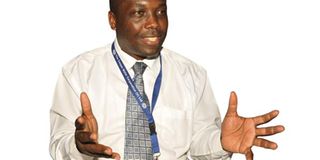Reviving a firm’s fortunes requires more than money

After coming to Uganda to take up his job at CMC, Herman Mbalasi felt like leaving the next day.
What you need to know:
After coming to Uganda to take up his job at CMC, Herman Mbalasi felt like leaving the next day. However, the Kenyan born has stayed on, changing a number of things at his current job. He told Didas Kisembo his struggles and future plans.
“I wanted to go back,” Herman Mbalasi, the Cooper Motor Corporation (CMC) country manager exclaims, upon being asked his first impressions after he first set foot in Uganda last year.
“Honestly, I wondered if this is how the market is. I saw the people, there was low motivation and I put my foot down, prayed to God to give me the understanding, knowledge and wisdom to resume,” he says.
Born on the Kenyan side of the Uganda – Kenya boarder, Mbalasi is a graduate of Economics from the University of Washington in US.
He worked as a sales administrator at General Motors Kenya, before joining Sam-Con in Kenya as the parts operation manager and later moving to CMC in 2002 at the Nakuru regional office.
In 2014, the Dubai-based Al-Futtaim Group purchased the 60 year-old CMC Holdings, appointing Mbalasi to manage its resurgence in Uganda.
“I came here last year in August from Kenya where I was heading the regional office in the Rift Valley Office in Nakuru. When this vacancy came up I was one of the people considered for this position,” he recalls.
But after a year on Mbalasi with assistance from Mark James Kass, the CMC Group chief executive officer, the company has been steered through the mending process lifting its franchise brands including, Mazda, Maruti, Suzuki, Nissan Diesel, Case CE, Case IH, and New Holland back to the market line.
Struggles
According to Mbalasi, reviving CMC has not been easy considering that at the time of his arrival staff motivation and consumer confidence was low.
“You see when a company has been advertised for sale, customer perception becomes negative. And because of that customers shied away from our company,” he says.
But this was the list of Mbalasi’s troubles, considering that staff motivation had dipped, which was a problem “I had to deal with”.
Similarly, Mbalasi says he found it challenging that a number of customer wanted to make part payment yet “we borrow, we buy and we need to sell and pay the loan”.
Change in strategy
Mbalasi explains that upon realising that the problem was not the system he set about to improve things, saying: “I just came in with an extra arm to support the already existing team. There was a communication breakdown, morale was low, and we put in place measures to ensure that staff are motivated and ensure that their daily lives are eased.”
And this has helped me up the employees morale and the business sales which has lifted the business from an average performance of about 50 per cent to more than 80 per cent.”
“We are trying to populate our product, create awareness and reassure the market that CMC is still there through several campaigns,” he says.
According to Mbalasi CMC has built a road map that would in the long term enable it cope with the current competition.
“At the moment we are running the Uganda business in Kampala alone but we are going to grow the business to other districts and towns. We intend to open up a facility in Mbarara, Mbale, Gulu and Soroti,” he says.
As part of that expansion, he says, each brand has its own brand manager and team that move the product.
“For example for Mazda we have a team doing that and the same goes for the heavy commercial brands. What we share is only the after-sales services for example in the sale of spare parts,” he explains, adding: “We have come up with the concept of a facility that can move a brand to another level by ensuring that there is a mobile clinic to move the parts. For example if you are stuck in Mbale, a mobile clinic will be dispatched to that area to address the problem,” he says.
What’s next?
Today, Uganda’s locomotive industry is dominated by used-car business which holds an 80 per cent grip on the market with the new-car dealers fighting it out for the remaining 20 per cent but Mbalasi says CMC is confident it has a sizeable grip on the market.
“You can see our brands everywhere. We sell to government, corporate companies and NGOs. Government is our main client,” he says.
And with the new 50 per cent environmental levy on cars beyond eight years, Mbalasi expects the market share to grow.
“CMC in the next four to five years will have very robust brands. The future looks bright that levy will push dealers to move away from the used car market,” he says.
The task at hand
When Herman Mbalasi came in Uganda he realised he had been hired to do a job, which demanded that he lifts the company - CMC Motors from a loss of staff motivation as well as restoring customer confidence.
But as he would later realise it demanded that he does more than the usual, especially in the area of dealing low sales and falling fortunes.




